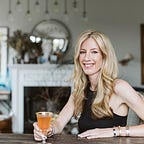A more conscious, if not totally dry, January
We might not all have got on board with “dry January”, but many of us shifted our consciousness about drinking in January 2021. A recent survey revealed that I, along with 40% of habitual drinkers that I know, participated in some form of dry January.
Before January 2021, it had been eight years since I’d taken 30 consecutive days off drinking alcohol. The Januaries of 2013 through 2020 were all pretty similar. They’d start off fueled by my good intentions and a promise to cut alcohol, sugar and carbs. At some point between January 5 and January 17, the pull of meeting a friend for a cozy cocktail in a dark bar would overtake any sober intentions and the dry spell would end. Happily, may I add, for the most part.
This January 2021 was different. Not only did I find myself really craving a break from alcohol after all of the dark, solo drinking I did to escape my isolation in 2020 (previous article about that phase here), but also, social plans were hard to come by. So I breezed through dry January 2021 pretty easily and enjoyed all of the extra reading, hot chocolate drinking and friend calling that I now had time to do.
During this time I got surprising notes from several old college friends with whom I’d lost touch. Each of these friends was as much of partier as I was pre pandemic. And each of these friends expressed how — at long last — over-imbibing was starting to lose its luster for them, just as it was for me. Additional calls with my broader network of natural-born partiers demonstrated that alcohol without connection was no longer doing it for people, and they were looking elsewhere to fill the void.
With a lot of qualitative anecdotes suggesting a shift in consciousness away from unconscious drinking, I decided to gather some quantitative data and see if it backed up my theory. I surveyed 52 people “like me”, by which I mean people their 30s and 40s with full-time jobs who generally like to drink alcohol and did so in 2020.
Even though the majority of people surveyed did not change their attitude or behavior toward drinking at all, I found it fascinating that 44% of them where changing their thoughts about alcohol. Many people expressed how drinking outside of social situations did not accomplish what drinking with friends used to, including comments such as “alcohol is much better when consumed with friends than alone” and “alcohol should be a social connector”. The general consensus was that people realized that, all along, they had been drinking to connect and not just to drink, and that drinking without connection was just not good drinking.
So what does this all mean? I’m no social data scientist, but I see a cosmic shift toward conscious connection with others. Now that the habitual drinkers among of us have learned to socialize on Zoom without alcohol, we’re re-learning how to value the true connection between ourselves and others over the glass of wine we used to think we absolutely needed at night. We’re thinking more about how connection makes us feel than how alcohol makes us feel. And while we’re really excited to get back into bars and restaurants to support the industry that we hold so dear, we’re doing so more because we want to feel connected to that community again than because we just want that drink.
I’d love to hear what you learned from dry January in the comments below. Cheers to you!
